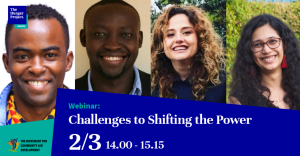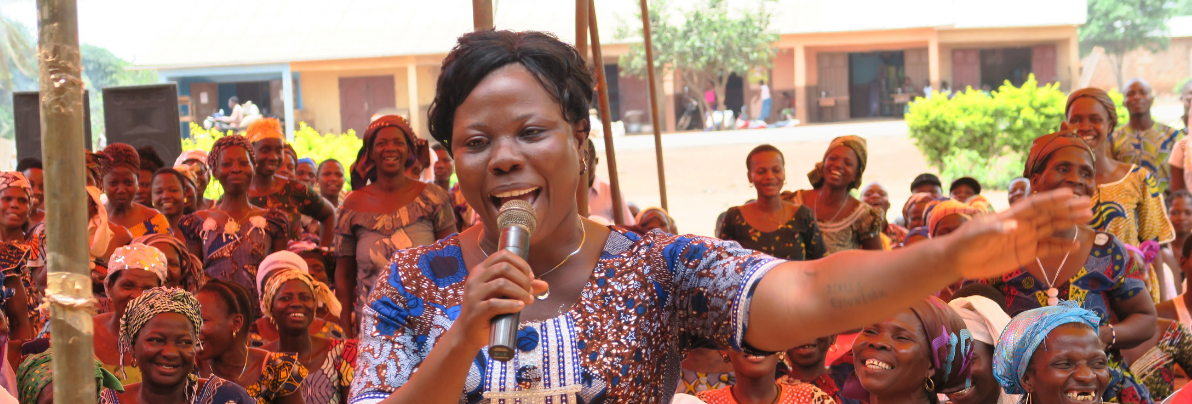Blog post authored by Yasmine El Mouhib, Advocacy and Programs Intern, The Hunger Project-Sweden
#ShiftThePower is becoming one of international development’s most prominent buzzwords. There is widespread consensus that currently, power is in the hands of donors and international NGOs, while the voices and agencies of partners in the Global South are muted, and that this needs to change. Despite the consensus, power imbalances and asymmetry persist. Why is this?
On March 2nd, The Hunger Project Sweden and The Movement for Community-led Development organized a webinar on the Challenges to Shifting the Power. Some of the challenges that were discussed in this webinar include the difficult process to apply for funding from major organizations and questioning who the system is really built for, as well as issues of accountability. Amra Levnjak, from the Swedish International Development Cooperation Agency (Sida) raised the important question of control and compliance versus results and who donors are accountable to, the taxpayers or the right holders?
This relates to another challenge in shifting the power, which is the fact that this very important discussion often becomes focused on money, as it is easier to circle around something tangible rather than the more abstract and complex issues of power. While the monetary issue is indeed highly important to address, power has more faces than money. Eshban Kwesiga from the Global Fund for Community Foundations (GFCF) made sure to take the conversation further by questioning “what is power?”. The key takeaway is that power encompasses things like who gets a seat at the table, who constructed the table, who is represented, and who gets to make the decisions and construct the projects and policies. That is where the real shift needs to happen. Founder of the Amani Initiative, Nixon Ochatre says that this is exactly what has been missing in the conversations on shifting power as he asks “how do we coexist?”. Power is not something that is easily given away by the powerful, therefore it is crucial to discuss coexistence to get further in the conversation and implementation of shifting power.
Gunjan Veda from The Movement for Community-led Development (MCLD) referred to what we currently know as the ‘Global South’ as the ‘Majority World’. Putting it this way, it really emphasizes that it is a minority that holds the power over the majority. Thus, Shifting the power means a shift of mindset, norms, relationships, and paradigms, not solely a shift of money. But how do we take the initial steps to shift the power? Our expert panel agreed that there is something that every individual and stakeholder can do.
Here are some examples:
- Make translations available so that everyone can participate in your events and take part in information and knowledge. This text is currently written in a colonialist language and it is important we recognize that.
- Admit that the system and institutions that we are navigating are not perfect and will not be. But we can learn from it and make sure that everyone has a voice in this ecosystem. This requires an appetite for failure.
- Make use of and emphasize local resources and capacities to help shift power closer to the people. Many Civil society organizations in the Majority World have been criticized because all their resources come from external actors. Demand devolution of power and promote community philanthropy to ensure local ownership of development.
- Keep this conversation alive. Discussing shifting power and its challenges is crucial but addressing solutions and actually implementing them is as important if we want to make real of these discussions.
Shifting the power is not a zero-sum game. It is about true and equitable partnerships and requires the action of everybody. Shifting the power is not a “Global South issue” or a “Majority World issue” if you will, the same way women’s rights is not a women’s issue. Therefore, we all need to look into our individual selves, our organizations, and our institutions, to see what part we can play in shifting the power.
We thank our wonderful panelists Amra Levnjak, Eshan Kwesiga, Nixon Ochatre, and Gunjan Veda as well as everyone who attended, for their contribution to a very rewarding and inspiring discussion. You can take part in the full content of the webinar here.
Featured Photo: Kissamey, Benin – The Hunger Project



